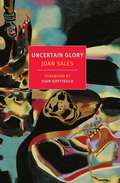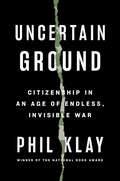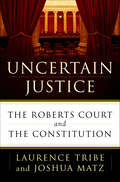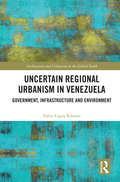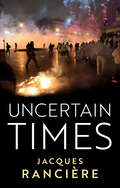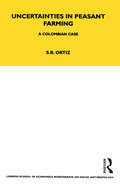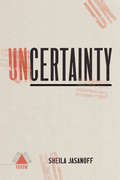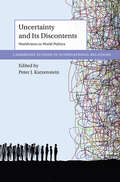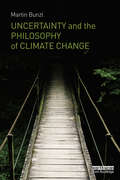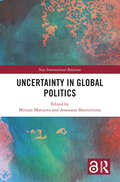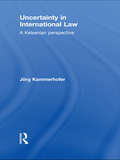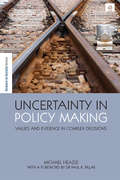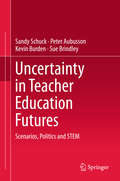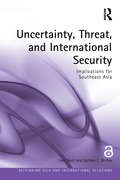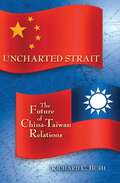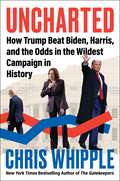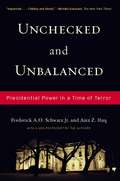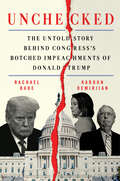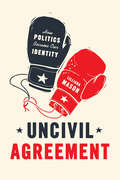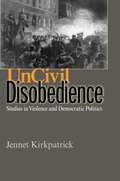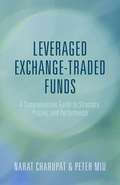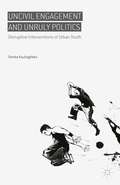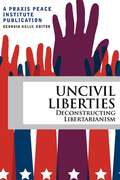- Table View
- List View
Uncertain Glory
by Juan Goytisolo Peter Bush Joan SalesA classic Catalan work about love, family, and class during the Spanish Civil war.Spain, 1937. Posted to the Aragonese front, Lieutenant Lluís Ruscalleda eschews the drunken antics of his comrades and goes in search of intrigue. But the lady of Castel de Olivo—a beautiful widow with a shadowy past—puts a high price on her affections. In Barcelona, Trini Milmany struggles to raise Lluís’s son on her own, letters from the front her only solace. With bombs falling as fast as the city’s morale, she leaves to spend the winter with Lluís’s brigade on a quiet section of the line. But even on “dead” fronts the guns do not stay silent for long. Trini’s decision will put her family’s fate in the hands of Juli Soleràs, an old friend and a traitor of easy conscience, a philosopher-cynic locked in an eternal struggle with himself.Joan Sales, a combatant in the Spanish Civil War, distilled his experiences into a timeless story of thwarted love, lost youth, and crushed illusions. A thrilling epic that has drawn comparison with the work of Dostoyevsky and Stendhal, Uncertain Glory is a homegrown counterpart to classics such as Homage to Catalonia and For Whom the Bell Tolls.
Uncertain Ground: Citizenship in an Age of Endless, Invisible War
by Phil KlayFrom the National Book Award-winning author of Redeployment and Missionaries, an astonishing fever graph of the effects of twenty years of war in a brutally divided America.When Phil Klay left the Marines a decade ago after serving as an officer in Iraq, he found himself a part of the community of veterans who have no choice but to grapple with the meaning of their wartime experiences—for themselves and for the country. American identity has always been bound up in war—from the revolutionary war of our founding, to the civil war that ended slavery, to the two world wars that launched America as a superpower. What did the current wars say about who we are as a country, and how should we respond as citizens? Unlike in previous eras of war, relatively few Americans have had to do any real grappling with the endless, invisible conflicts of the post-9/11 world; in fact, increasingly few people are even aware they are still going on. It is as if these wars are a dark star with a strong gravitational force that draws a relatively small number of soldiers and their families into its orbit while remaining inconspicuous to most other Americans. In the meantime, the consequences of American military action abroad may be out of sight and out of mind, but they are very real indeed. This chasm between the military and the civilian in American life, and the moral blind spot it has created, is one of the great themes of Uncertain Ground, Phil Klay&’s powerful series of reckonings with some of our country&’s thorniest concerns, written in essay form over the past ten years. In the name of what do we ask young Americans to kill, and to die? In the name of what does this country hang together? As we see at every turn in these pages, those two questions have a great deal to do with each another, and how we answer them will go a long way toward deciding where our troubled country goes from here.
Uncertain Justice: The Roberts Court and the Constitution
by Laurence Tribe Joshua Matz“Illuminating. . . . [Tribe and Matz] offer well-crafted overviews of key cases decided by the Roberts Court [and] chart the Supreme Court’s conservative path.” —Chicago TribuneFrom Citizens United to its momentous rulings regarding Obamacare and gay marriage, the Supreme Court under Chief Justice John Roberts has profoundly affected American life. Yet the court remains a mysterious institution, and the motivations of the nine men and women who serve for life are often obscure. In Uncertain Justice, Laurence Tribe and Joshua Matz show the surprising extent to which the Roberts Court is revising the meaning of our Constitution.Political gridlock, cultural change, and technological progress mean that the court’s decisions on key topics—including free speech, privacy, voting rights, and presidential power—could be uniquely durable. Acutely aware of their opportunity, the justices are rewriting critical aspects of constitutional law and redrawing the ground rules of American government. Tribe—one of the country’s leading constitutional lawyers—and Matz dig deeply into the court’s rulings, stepping beyond tired debates over judicial “activism” to draw out hidden meanings and silent battles. The undercurrents they reveal suggest a strikingly different vision for the future of our country, one that is sure to be hotly debated.Filled with original insights and compelling human stories, Uncertain Justice illuminates the most colorful story of all—how the Supreme Court and the Constitution frame the way we live.“A brilliantly layered account . . . Filled with memorable stories and striking references to literature, baseball and popular culture, this book is a joy to read from start to finish.” —Doris Kearns Goodwin, Pulitzer Prize winner and #1 New York Times–bestselling author of Team of Rivals“Well-written and highly readable . . . The strength of the book is its painstaking explanation of all sides of the critical cases, giving full voice and weight to conservative and liberal views alike.” —The Washington Post
Uncertain Regional Urbanism in Venezuela: Government, Infrastructure and Environment (Architecture and Urbanism in the Global South)
by Fabio Capra RibeiroUncertain Regional Urbanism in Venezuela explores the changes cities face when they become metropolises, forming expanding regions which create both potential and problems within settlements. To do so, it focuses on three metropolitan areas located in Venezuela’s Center-North region: Caracas, Maracay and Valencia, designated as "Camava." Considering three core topics, government and territorial administration, infrastructure and environment, as well as looking at the reciprocal impact, this book describes and analyzes the determinant variables that characterize the phenomenon of regional urbanization in this area and in the wider Global South. It includes documentary research, semi-structured interviews and Delphi methodology, involving a total of forty experts from different disciplines to build a comprehensive outlook on the situation. This book presents a broader understanding of the region to encourage a more sustainable and knowledge-based development plan, moving away from the exploitation of natural resources, with six future-oriented scenarios to consider. This is a much-needed study in the urban regions of Venezuela, which will be of interest to academics and researchers in Latin American studies, the Global South, architecture and planning.
Uncertain Times
by Jacques RanciereThe global triumph of democracy was announced thirty years ago, promising an age of consensus in which the dispassionate consideration of objective problems would give birth to a world at peace. Today, these grand hopes lie in ruins, and the era touted as new has turned out to be remarkably similar to the old order. To understand why this might be so, we need to examine the nature of the consensus itself, which is not the peace that it promised but rather the map of a territory on which new forms of warfare are being waged. The objective reality that imposed itself at the end of the 1990s was an absolutized and globalized capitalism which has produced ever more inequality, exclusion and hate. In this book Jacques Rancière delivers a frank and piercing critique of the globalized capitalist consensus. The invasion of Iraq, the riots on Capitol Hill and the rise of the European far right all attest to the true nature of this consensus, as does the current state-sanctioned racism which exploits the disenchanted progressive tradition and is led by an intelligentsia that claims to be left-wing. At the same time, Rancière praises the dynamism of social movements which affirm the power of the assembly of equals and its capacity for worldmaking: autonomous protest collectives have proven themselves capable of opening breaches in the consensual order and challenging the post-1989 system of domination.
Uncertainties in Peasant Farming: A Colombian Case (LSE Monographs on Social Anthropology)
by Sutti OrtizThis book examines the life and historical background of the Paez peasants of Colombia and their relationship with the land, including issues of tenure, inheritance and the allocation of resources.
Uncertainty (Boston Review / Forum)
by Sheila JasanoffA wide-raging exploration of the place of uncertainty in our emotional and political lives.From climate change to the pandemic, uncertainty looms large over our public and personal lives. It is also the core feature of democratic life: while democratic governance seemingly heightens individual power, it exposes our life chances to the uncertain activity of others. We do not exercise control over those to whom we appeal, and yet we are constantly dependent on their actions for the goods in life we seek. Sheila Jasanoff opens a forum on uncertainty and democracy in this volume, arguing that ideas around our autonomy, our freedom, and our individual agency, particularly in the US, obscure our dependence on others in so many ways. To recognize this political emotion is to start to see the transformative potential in uncertainty. The debate that follows explores the ideas about uncertainty and experts in a democracy, as well its scientific, philosophic, and emotional aspects.
Uncertainty and Its Discontents: Worldviews in World Politics (Cambridge Studies in International Relations)
by Peter J. KatzensteinThis volume provides the first major study of worldviews in international relations. Worldviews are the unexamined, pre-theoretical foundations of the approaches with which we understand and navigate the world. Advances in twentieth century physics and cosmology and other intellectual developments questioning anthropocentrism have fostered the articulation of alternative worldviews that rival conventional Newtonian humanism and its assumption that the world is constituted by controllable risks. This matters for coming to terms with the uncertainties that are an indelible part of many spheres of life including public health, the environment, finance, security and politics – uncertainties that are concealed by the conventional presumption that the world is governed only by risk. The confluence of risk and uncertainty requires an awareness of alternative worldviews, alerts us to possible intersections between humanist Newtonianism and hyper-humanist Post-Newtonianism, and reminds us of the relevance of science, religion and moral values in world politics.
Uncertainty and the Philosophy of Climate Change
by Martin BunzlWhen it comes to climate change, the greatest difficulty we face is that we do not know the likely degree of change or its cost, which means that environmental policy decisions have to be made under uncertainty. This book offers an accessible philosophical treatment of the broad range of ethical and policy challenges posed by climate change uncertainty. Drawing on both the philosophy of science and ethics, Martin Bunzl shows how tackling climate change revolves around weighing up our interests now against those of future generations, which requires that we examine our assumptions about the value of present costs versus future benefits. In an engaging, conversational style, Bunzl looks at questions such as our responsibility towards non-human life, the interests of the developing and developed worlds, and how the circumstances of poverty shape the perception of risk, ultimate developing and defending a view of humanity and its place in the world that makes sense of our duty to Nature without treating it as a rights bearer. This book will be of interest to students and scholars of environmental studies, philosophy, politics and sociology as well as policy makers.
Uncertainty in Global Politics (New International Relations)
by Miriam Matejova and Anastasia ShesterininaThis book engages in a constructive, practical debate on the nature and effects of uncertainty in global politics. International contributors explore the processes associated with different forms of uncertainty in the context of environmental issues, diplomacy and international negotiations, and conflict and security. From the collapse of the Soviet Union to the 1997 and 2008 financial crises to the Arab Uprisings and the European migrant crisis and the COVID-19 pandemic, assessments of many events with lasting consequences on the global order have begun with: “why didn’t we see this coming?” There is much to learn from how phenomena that affect the global order generate uncertainty and what effects such uncertainty has on actors and issues. Presenting perspectives from all corners of the discipline and emerging and established scholars the book provides an up-to-date overview of the state of the literature; a concise yet conceptually rich theoretical framework; a mix of regional and global contemporary issues; process-oriented empirical evidence and methodological tools to assess different forms of uncertainty and propose practical solutions to addressing uncertainty in diverse contexts. The book will be of interest to scholars of global politics, international security, global environmental politics, international organizations and institutions, social movements, and conflict studies.
Uncertainty in International Law: A Kelsenian Perspective
by Jörg KammerhoferRe-engaging with the Pure Theory of Law developed by Hans Kelsen and the other members of the Viennese School of Jurisprudence, this book looks at the causes and manifestations of uncertainty in international law. It considers both epistemological uncertainty as to whether we can accurately perceive norms in international law, and ontological problems which occur inter alia where two or more norms conflict. The book looks at these issues of uncertainty in relation to the foundational doctrines of public international law, including the law of self-defence under the United Nations Charter, customary international law, and the interpretation of treaties. In viewing international law through the lens of Kelsen’s theory Jörg Kammerhofer demonstrates the importance of the theoretical dimension for the study of international law and offers a critique of the recent trend towards pragmatism and eclecticism in international legal scholarship. The unique aspect of the monograph is that it is the only book to apply the Pure Theory of Law as theoretical approach to international law, rather than simply being a piece of intellectual history describing it. This book will of great interest to students and scholars of public international law, legal theory and jurisprudence.
Uncertainty in Policy Making: Values and Evidence in Complex Decisions (The Earthscan Science in Society Series)
by Michael HeazleUncertainty in Policy Making explores how uncertainty is interpreted and used by policy makers, experts and politicians. It argues that conventional notions of rational, evidence-based policy making - hailed by governments and organisations across the world as the only way to make good policy - is an impossible aim in highly complex and uncertain environments; the blind pursuit of such a 'rational' goal is in fact irrational in a world of competing values and interests. The book centres around two high-profile and important case studies: the Iraq war and climate change policy in the US, UK and Australia. Based on three years' research, including interviews with experts such as Hans Blix, Paul Pillar, and Brian Jones, these two case studies show that the treatment of uncertainty issues in specialist advice is largely determined by how well the advice fits with or contradicts the policy goals and orientation of the policy elite. Instead of allowing the debates to be side-tracked by arguments over whose science or expert advice is 'more right', we must accept that uncertainty in complex issues is unavoidable and recognise the values and interests that lie at the heart of the issues. The book offers a 'hedging' approach which will enable policy makers to manage rather than eliminate uncertainty.
Uncertainty in Teacher Education Futures: Scenarios, Politics and STEM
by Sandy Schuck Peter Aubusson Kevin Burden Sue BrindleyThis book discusses the use of futures methodologies to examine and critique teacher education and investigate drivers of change in teacher education contexts, providing readers with futures tools that they can use to explore curricula and pedagogies. It explains futures methods, including scenario development and backcasting, and illustrates them with examples of research in science, technology and mathematics education contexts. By allowing the long-term influence of current trends to be considered and providing an opportunity to reflect on the present and imagine the future, scenarios provoke discussion on the directions that teacher education might take now. The book offers insights into the possibilities that might exist for teacher education futures and into how scenario building and planning can be used to inform debates about the present. Further, it suggests ways in which readers can influence the future of teacher education through understanding the drivers of change.
Uncertainty, Threat, and International Security: Implications for Southeast Asia (Rethinking Asia and International Relations)
by Ivan Savic Zachary C. ShirkeyThe rise of China is changing the strategic landscape globally and regionally. How states respond to potential threats posed by this new power arrangement will be crucial to international relations for the coming decades. This book builds on existing realist and rationalist concepts of balancing, bandwagoning, commitment problems, and asymmetric information to craft explanations about how states respond when faced with potential threats. Specifically, the book explores the role different types of uncertainty play in potential balancing situations. Particular focus is given to the nature of the rising state’s actions, the balance of forces, and the value of delay. These concepts are analysed and illustrated through a series of case studies on Europe in the 1930s as well as the present-day Southeast Asia, looking at great powers such as Britain and France, but also a wide range of smaller powers including Poland, Yugoslavia, Vietnam, and the Philippines.
Uncharted Strait
by Richard C. BushThe future of the Taiwan Strait is more wide open than at any other time in recent decades. Tensions between China and Taiwan have eased since 2008. But the movement toward full rapprochement remains fragile. Whether the two sides of the Strait can sustain and expand a cooperative relationship after years of mutual distrust and fear is still uncertain.The waters of the Strait are uncharted, and each side worries about shoals beneath the surface. The current engagement between Beijing and Taipei may make possible a solution to their six-decade-long dispute. Whether, when, and how that might happen is, however, shrouded in doubt. China fears the island's permanent separation, by way of either an overt move to de jure independence or continued refusal to unify with the mainland. Taiwan fears subordination to an authoritarian regime that does not have Taipei's interests at heart. And the United States worries about the stability of the East Asian region.Richard Bush, who studied issues surrounding Taiwan during almost twenty years in the U.S. government, explains the current state of relations between China and Taiwan, providing the details of what led to the current situation. And he extrapolates on the likely future of cross-Strait relations. Bush also discusses America's stake, analyzing possible ramifications for U.S. interests in the critically important East Asia region and recommends steps to protect those interests."At the heart of the [Taiwan conundrum] is a question of definition. Does the dispute stem from the protracted division of the Chinese state after World War II, or does the Republic of China on Taiwan in some sense constitute a successor state of the old Republic of China (ROC), one on a par with the People's Republic of China on the Chinese mainland? Whether and how the unification of the two entities might occur hinges on the answer. Indeed, I have argued that the core of the dispute between the two sides has been their disagreement over whether the Republic of China--or Taiwan--is a sovereign entity for purposes of cross-Strait relations. It follows that if unification is a real option, the two sides must form a political union that bridges the disagreement over the island's legal status. Is that possible?"--from the Introduction
Uncharted Strait
by Richard C. BushThe future of the Taiwan Strait is more wide open than at any other time in recent decades. Tensions between China and Taiwan have eased since 2008. But the movement toward full rapprochement remains fragile. Whether the two sides of the Strait can sustain and expand a cooperative relationship after years of mutual distrust and fear is still uncertain.The waters of the Strait are uncharted, and each side worries about shoals beneath the surface. The current engagement between Beijing and Taipei may make possible a solution to their six-decade-long dispute. Whether, when, and how that might happen is, however, shrouded in doubt. China fears the island's permanent separation, by way of either an overt move to de jure independence or continued refusal to unify with the mainland. Taiwan fears subordination to an authoritarian regime that does not have Taipei's interests at heart. And the United States worries about the stability of the East Asian region.Richard Bush, who studied issues surrounding Taiwan during almost twenty years in the U.S. government, explains the current state of relations between China and Taiwan, providing the details of what led to the current situation. And he extrapolates on the likely future of cross-Strait relations. Bush also discusses America's stake, analyzing possible ramifications for U.S. interests in the critically important East Asia region and recommends steps to protect those interests."At the heart of the [Taiwan conundrum] is a question of definition. Does the dispute stem from the protracted division of the Chinese state after World War II, or does the Republic of China on Taiwan in some sense constitute a successor state of the old Republic of China (ROC), one on a par with the People's Republic of China on the Chinese mainland? Whether and how the unification of the two entities might occur hinges on the answer. Indeed, I have argued that the core of the dispute between the two sides has been their disagreement over whether the Republic of China-or Taiwan-is a sovereign entity for purposes of cross-Strait relations. It follows that if unification is a real option, the two sides must form a political union that bridges the disagreement over the island's legal status. Is that possible?"-from the Introduction
Uncharted: How Trump Beat Biden, Harris, and the Odds in the Wildest Campaign in History
by Chris WhippleThe New York Times bestselling author of The Gatekeepers and The Spymasters now turns his sharp eye towards the historic 2024 presidential race, providing the definitive, insider account of the most dramatic and significant political showdown in modern American history. <p> A disastrous debate, a would-be assassin’s bullet, an electrifying eleventh hour candidate swap, dramatic and surprising VP selections, betrayals behind closed doors, charges of a stolen election, game-changing blunders—the history-making 2024 presidential election is a political saga of Shakespearean proportions. <p> In minute-by-minute detail, esteemed White House historian and political analyst Chris Whipple chronicles the unprecedented drama as it unfolds, documenting the true story of the Harris and Trump campaigns and the difficult, urgent decisions made in the back rooms of power, with the future of American democracy at stake. <p> Alternating between the Biden/Harris/Walz and the Trump/Vance camps, Whipple tells the fly-on-the-wall story of campaign 2024, drawing on his unique access to exclusive sources on both sides, including conversations with members of the candidates’ inner circles. Whipple goes behind the scenes of every headline-making moment to reveal how a post-debate intra-party rebellion forced Biden to step aside, how the nomination of Vice President Harris at a thrilling convention reshaped the race, how Harris rallied excited voters across generations and demographics, but ultimately could not overcome the underlying weaknesses of her campaign. Whipple also burrows inside Donald Trump’s campaign to reveal startling new insights into how he overcame primary opponents and multiple prosecutions, rebranded his base to appeal to Gen Z voters, and forged powerful alliances with Silicon Valley CEOs like Elon Musk. <p> An intimate portrait of American politics on the edge, filled with previously untold stories, anecdotes, and insights, Uncharted is the authoritative account of this pivotal chapter in American politics. As he brings to life the most dramatic and important presidential campaign of the modern age and puts it into historical perspective, Whipple exposes how ambition, conviction, and resilience collide at the highest echelons of power, offering a deeper understanding of the forces that define a divided nation. <b>New York Times Bestseller</b>
Unchecked And Unbalanced
by Frederick A. O. Schwarz Jr. Aziz Z. HuqThirty years after the Church Committee unearthed COINTELPRO and other instances of illicit executive behavior on the domestic and international fronts, the Bush administration has elevated the flaws identified by the committee into first principles of government.Through a constellation of non-public laws and opaque, unaccountable institutions, the current administration has created a "secret presidency" run by classified presidential decisions and orders about national security. A hyperactive Office of Legal Counsel in the Department of Justice is intent on eliminating checks on presidential power and testing that power's limits. Decisions are routinely executed at senior levels within the civilian administration without input from Congress or the federal courts, let alone our international allies. Secret NSA spying at home is the most recent of these. Harsh treatment of detainees, "extraordinary renditions," secret foreign prisons, and the newly minted enemy combatant designation have also undermined our values. The resulting policies have harmed counterterrorism efforts and produced few tangible results.With a partisan Congress predictably reluctant to censure a politically aligned president, it is all the more important for citizens themselves to demand disclosure, oversight, and restraint of sweeping claims of executive power. This book is the first step.
Unchecked: The Untold Story Behind Congress's Botched Impeachments of Donald Trump
by Rachael Bade Karoun DemirjianA revealing, behind-the-scenes examination of how Congress twice fumbled its best chance to hold accountable a president many considered one of the most dangerous in American history. The definitive—and only—insider account of both Trump impeachments, as told by the two reporters on the front lines covering them for The Washington Post and Politico.In a riveting account that flips the script on what readers think they know about the two impeachments of Donald Trump, Rachael Bade and Karoun Demirjian reveal how—and why—congressional oversight failed when it was needed most.Unchecked weaves a vivid narrative of how House Democrats under the lead of a cautious speaker, Nancy Pelosi, hesitated for months to stand up to Trump—and then pulled punches in their effort to oust him in a misguided effort to protect themselves politically. What they left on the cutting room floor would come back to haunt them, as Republicans seized on their missteps to whip an uneasy GOP rank-and-file into line behind Donald Trump, abandoning their scruples to defend a president who some privately believed had indeed abused his power.Even after Trump incited a mob to violently attack the Capitol—a day the authors recount in minute-by-minute, stunning detail — Democrats pressured their own investigators to forego a thorough investigation in the name of safeguarding the Biden agenda. And Republicans, fearful of repelling a base they needed for re-election, missed their best moment to turn their backs on a leader they secretly agreed was destructive to democracy.Sourced from hundreds of interviews with all the key players, the authors of Unchecked pull back the curtain on how both parties pursued political expediency over fact-finding. The end result not only emboldened Trump, giving him room for a political comeback, but also undermined Congress by rendering toothless their most powerful check on a president: the power of impeachment. A dramatic and at times crushing work of investigative reporting, Unchecked is both a gripping page-turner of political intrigue and a detailed case study for historians and political scientists searching for answers about the unravelling of checks and balances that have governed American democracy for centuries.
Uncivil Agreement: How Politics Became Our Identity
by Lilliana MasonPolitical polarization in America is at an all-time high, and the conflict has moved beyond disagreements about matters of policy. For the first time in more than twenty years, research has shown that members of both parties hold strongly unfavorable views of their opponents. This is polarization rooted in social identity, and it is growing. The campaign and election of Donald Trump laid bare this fact of the American electorate, its successful rhetoric of “us versus them” tapping into a powerful current of anger and resentment. With Uncivil Agreement, Lilliana Mason looks at the growing social gulf across racial, religious, and cultural lines, which have recently come to divide neatly between the two major political parties. She argues that group identifications have changed the way we think and feel about ourselves and our opponents. Even when Democrats and Republicans can agree on policy outcomes, they tend to view one other with distrust and to work for party victory over all else. Although the polarizing effects of social divisions have simplified our electoral choices and increased political engagement, they have not been a force that is, on balance, helpful for American democracy. Bringing together theory from political science and social psychology, Uncivil Agreement clearly describes this increasingly “social” type of polarization in American politics and will add much to our understanding of contemporary politics.
Uncivil Disobedience: Studies in Violence and Democratic Politics
by Jennet KirkpatrickUncivil Disobedience examines the roles violence and terrorism have played in the exercise of democratic ideals in America. Jennet Kirkpatrick explores how crowds, rallying behind the principle of popular sovereignty and desiring to make law conform to justice, can disdain law and engage in violence. She exposes the hazards of democracy that arise when citizens seek to control government directly, and demonstrates the importance of laws and institutions as limitations on the will of the people. Kirkpatrick looks at some of the most explosive instances of uncivil disobedience in American history: the contemporary militia movement, Southern lynch mobs, frontier vigilantism, and militant abolitionism. She argues that the groups behind these violent episodes are often motivated by admirable democratic ideas of popular power and autonomy. Kirkpatrick shows how, in this respect, they are not so unlike the much-admired adherents of nonviolent civil disobedience, yet she reveals how those who engage in violent disobedience use these admirable democratic principles as a justification for terrorism and killing. She uses a "bottom-up" analysis of events to explain how this transformation takes place, paying close attention to what members of these groups do and how they think about the relationship between citizens and the law. Uncivil Disobedience calls for a new vision of liberal democracy where the rule of the people and the rule of law are recognized as fundamental ideals, and where neither is triumphant or transcendent.
Uncivil Engagement and Unruly Politics: Disruptive Interventions of Urban Youth
by Femke KaulingfreksThis book explores the significance of riots and public disturbances caused by marginalized youth with a migrant background in France and the Netherlands, and how their demands for recognition, justice and equal opportunities are voiced in uncivil, yet politically meaningful ways.
Uncivil Engagement and Unruly Politics: Disruptive Interventions of Urban Youth
by Femke KaulingfreksThis book explores the significance of riots and public disturbances caused by marginalized youth with a migrant background in France and the Netherlands, and how their demands for recognition, justice and equal opportunities are voiced in uncivil, yet politically meaningful ways.
Uncivil Liberties
by Calvin TrillinAnecdotes and satires on United States politics and government, as Trillin wrote them during his years as a columnist at The Nation.
Uncivil Liberties: Deconstructing Libertarianism
by Hazel Henderson Gus Dizerega Benjamin Colby Ben Boyce Barry Spector Julianne Maurseth Georgia KellyLast year, Praxis Peace Institute responded to the libertarian conspiracy film Thrive with a pamphlet titled "Uncivil Liberties: Deconstructing Libertarianism," carefully and concisely laying out the problems inherent in libertarian philosophy and why it is so appealing to today's society. Now, in a book by the same name, six contributors from Praxis have expounded on their arguments to create a compelling case against the radical tenants of libertarianism, demonstrating the untruths promoted within libertarian culture and how concerned citizens can avoid and refute common myths spread by extreme right-wing ideologies. This book is a must-read for anyone invested in modern politics and the future of the United States.
